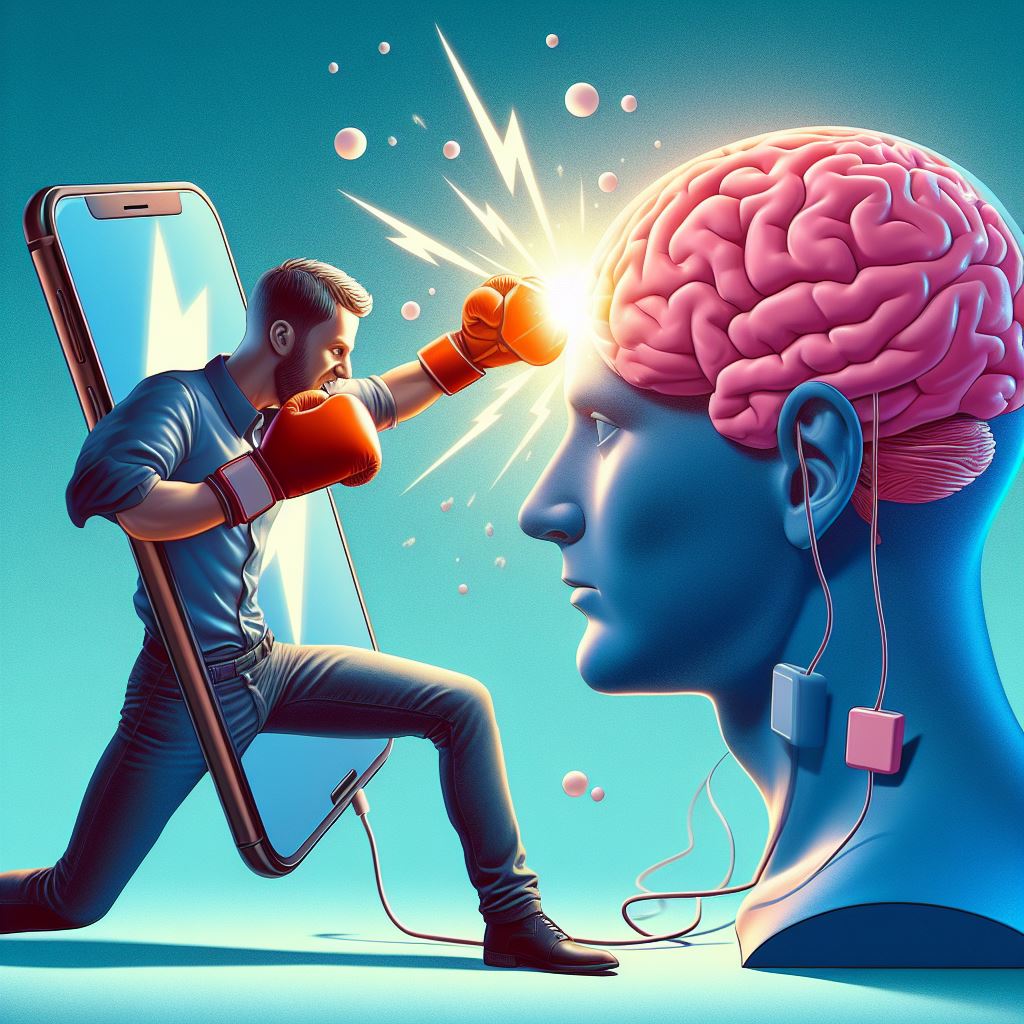Phones vs Brain. Who is Really Winning?
Mobile phones have been around for several decades. As a result, they have become an essential tool in many people’s lives. Phones are useful for completing several tasks, from communicating with friends and family to something as simple as ordering food. Despite the practicality of these devices, the question arises if these “helpful tools” can cause harm to our brains.

Electronic Devices and Daily Life
You wake up in the morning and check your phone for new emails or text messages. Perhaps you even glance at your social media. Before leaving home, you check your phone to find out if it will be a hot or cold day to dress accordingly. Later in the day, you may need to contact your boss regarding a question. Do any of these scenarios sound familiar?
According to a cellphone usage statistic, it is said that adults living in the US check their phones about 344 times per day, during four-minute intervals. Their screen time adds up to approximately three hours every day. We can have set in mind to quickly check something on our electronic devices and unintentionally fall down a rabbit hole of carrying out various phone-related tasks. Unfortunately, these tasks can steal much of our time.
The Downside of Digital Dependence
We, as a society, have grown extremely reliant on technology to complete even the simplest tasks. Is this reliance on our phones damaging to our lives? Many people who reside in the US live very busy lives, making multitasking a common practice. Although multitasking can seem like an effective habit, it only results negatively in our overall everyday performance. Research has concluded that speaking with someone via phone call is enough to distract someone while driving. This can cause one’s focus to divert from the road. Additionally, a mere notification “ding” is said to drastically decrease one’s work performance.
Just the presence of a cell phone is enough to interrupt our thought process. A study was conducted to demonstrate how phone usage can affect our brains. A group of participants had their phones within their reach or in a visible place. The other participants’ phones were out of their reach or sight. Those who had their phones out of reach, in a different room, resulted to work more efficiently in comparison rather than those who had their phones nearby.
This experiment concludes that no matter our efforts put into working diligently, our brain subconsciously feels the need to check on our phones. The only “solution” according to the study was to place one’s mobile device in a completely different room.
The Upside of Mobile Phone Usage
Despite having its disadvantages, phone usage also possesses some positive attributes. Researchers have found that phone usage can relatively enhance memory. In a recent investigation, participants were requested to interact with a screen that showed numbered circles. They were required to drag these circles to either side of the screen. The payment for each circle was compatible with the number inscribed on it. Half of the participants were permitted to take notes on the screen, indicating which circles should be moved in which direction. In contrast, the other half had to rely on their memory alone.
This study showed that accessing digital reminders can enhance an individual’s performance. Surprisingly, not only were high-value circles that were jotted down remembered but low-value circles that weren’t recorded were also retained. The researchers suggested that by relying on technology to store critical data, the brain is better equipped to retain less important information. Once the participants were no longer able to access the reminders, they still recalled the low-value circle. However, the memory of the high-value circles was obsolete.
Final Thoughts
There is yet so much to explore to fully comprehend the long-lasting effects of device dependence on our willpower and cognition. For the time being, there exists an alternative solution that we can consider to minimize the adverse effects of this issue. It pertains to how we perceive our cognitive abilities. In his book, The Expectation Effect, David Robson presents compelling research that refutes the idea that exerting our willpower in one area exhausts our mental reserves. This makes it harder to concentrate on other tasks. While this may hold some truth, it is mostly dependent on our mindset.
Individuals who hold the belief that our brains possess limited resources are at an increased risk of experiencing mental exhaustion and displaying reduced self-discipline during tasks. Conversely, those who subscribe to the notion that resisting temptation enhances our ability to do so, are certain that our brain’s resources are limitless. As a result, they can exhibit self-control without experiencing mental fatigue. Additionally, their performance on subsequent tasks remains unaffected.
In summation, to reduce mindless phone usage, one can plan to persist in placing it in a separate room. Furthermore, we can frequently remind ourselves that our brains hold more capacity than what it is given credit for. Each time we successfully avoid the urge to check our phones, a new neural connection is built. Such connection will be of assistance in resisting similar impulses down the road.
Bibliography
Ruggeri, Amanda. “How Mobile Phones Have Changed Our Brains.” BBC News, BBC, 18 May 2023, www.bbc.com/future/article/20230403-how-cellphones-have-changed-our-brains.
